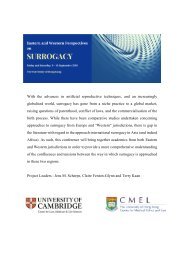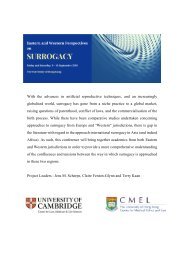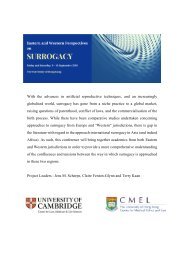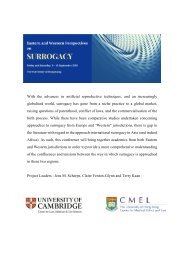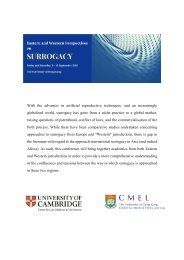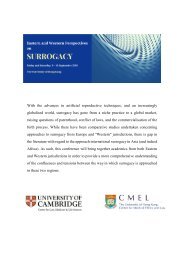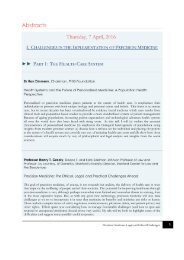PM conference programme_2016.04.05_concise_Clean(Latest)
Create successful ePaper yourself
Turn your PDF publications into a flip-book with our unique Google optimized e-Paper software.
Dr Chih-Hsing Ho, Assistant Professor, Academia Sinica, Taiwan<br />
From Bench to Bedside: Secondary Use of Health Data for Precision Medicine<br />
Many biomedical projects have been relying on large consortia of repositories, such as networks of biobanks, to<br />
increase the overall size of bio-samples and data for statistical significance. Nevertheless, the increasing need for<br />
transmission and linkage of health data for secondary usage has brought new challenges to translational research.<br />
The current models and privacy frameworks for the secondary use of health data focus predominately on<br />
techniques and rules of anonymization or de-identification. These data-centric perspectives fail to adequately<br />
address issues such as data control, access and sharing, all of which are imperative to data subjects in terms of<br />
deciding how they would like their health information to be used for future research. This talk will investigate these<br />
challenges, especially with regards to the secondary use of health data in precision medicine. It aims at proposing a<br />
transparent and community-based data sharing model to improve the pitfalls of data-centric models for the<br />
secondary use of health data in translational research.<br />
Dr Stuart Hogarth, Senior Research Fellow, Department of Social Science, Health and Medicine,<br />
King's College London<br />
Lost on Planet Biomarker? Standards, Pathways, Carrots and Sticks for Diagnostic<br />
Development in the Post-genomic Era<br />
In this talk I will situate current debates about the development and regulation of molecular diagnostics in the<br />
broader historical context of longstanding efforts to provide greater conceptual clarity and scientific rigour to<br />
diagnostic research. I will offer some suggestions as to why repeated complaints of poor scientific standard and<br />
calls for reform have had limited impact, review examples of recent initiatives championed by a variety of<br />
institutional actors, and conclude by proposing that current developments may finally offer some hope of significant<br />
and sustained change.<br />
Dr Timo Minssen, Associate Professor of IP & Innovation Law, University of Copenhagen, Centre for<br />
Information & Innovation Law<br />
Lost in Translation? Opportunities & Risks of Increased Research & Clinical Trials Data<br />
Transparency<br />
Recent US and European initiatives reflect a growing policy consensus favoring greater clinical trials and research<br />
transparency. New legislation, publishers and industry-driven projects promote independent verification of drug<br />
data, which provides a better framework for international collaboration. Greater transparency also increases public<br />
trust in research results, drugs and industry and the possibility of facilitating large cross-border clinical trials. Yet,<br />
the costs and concerns associated with opening up research and clinical trial data are also significant—for patients<br />
(protection of personal data and patient privacy), for research (misuse of clinical trial data) and for technology<br />
transfer and commercialization (obstacles to IP protection and increased exposure to litigation). This presentation<br />
will discuss these issues from an interdisciplinary perspective in order to sketch out legal mechanism that could be<br />
useful for unlocking and safe-guarding the full potential of greater transparency.<br />
PRECISION MEDICINE: LEGAL AND ETHICAL CHALLENGES 10



